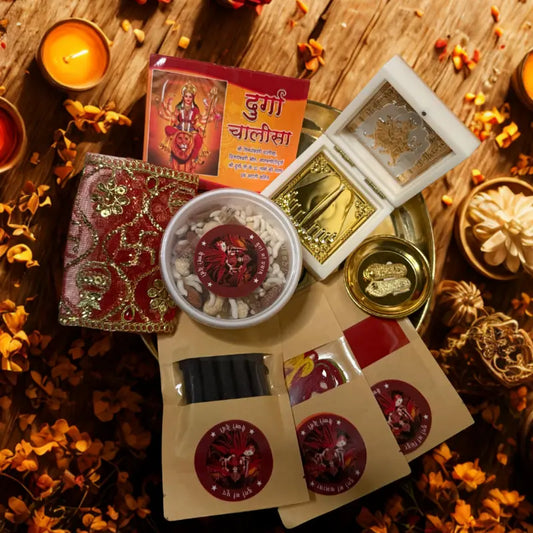
The Hidden Spiritual Science of Prasadam in Hindu Tradition
Share
What is Prasadam?
Prasadam (or prasad) is a word derived from Sanskrit and means 'grace' or 'favor.' In Hindu worship, prasadam means a material offering of something—generally food—that is offered to a deity in a ritual. Once the offering is made, the offering is sanctified and returned to the devotee in the form of divine grace that represents the blessings of the deity.
Prasadam is not a ritual; it is a divine exchange: the devotee's love and devotion meets the divine grace of acceptance. Eating prasadam is an act of physically partaking in God's blessing and mercy, with the understanding that all food belongs to the spiritual world.
Spiritual Significance of Prasadam
- The Symbol of God: Prasadam is a tangible blessing from God, a means through which a human approach to the divine is enabled.
- Energy Transfer: When a devotee offers food or items, the act creates a laden vibratory energy that is an offering to the spirit and raises the energy of the consumer when they partake.
- Purity: The sanctified food or item is said to purify the mind and the body, promoting peace, clarity, and spirituality.
- Harmony and Affinity: Sharing Prasadam creates mutual harmony amongst devotees, providing spiritual equality for regulated consumption of Prasadam.

The Ritual of Offering Prasadam
Offering prasadam is devotional service. Devotees always do the following:
- Use clean and pure ingredients;
- Make sure food is prepared with no ego and no urgency, with a positive attitude;
- Omits certain foods such as onions and garlic to avoid tamasic (stuff that lacked mental clarity and positive action) qualities; and
- When prasadam is offered, fresh and clean vessels are used.
After samarpan (offering), the prasadam is distributed to everyone equally, which symbolizes the deity's received offering and everyone's participation in receiving divine blessings.
Prasad Benefits: Beyond Physical Nourishment
- Spiritual Food: Eating prasadam is thought to enhance spiritual relationships and awaken internal spirituality.
- Healing Elements: The charge of this food is said to carry subtle healing waves, which can be supportive to mental and emotional well-being.
- Emotional Pick-Me-Up: Prasadam imparts joy, thanksgiving, and peace, and these three qualities are beneficial to our stability.
- Blessings and Protection: People take prasadam with a sense of faith that it provides goodwill, protection from negativity, and favors the divine.

Types of Sacred Offerings Considered Prasadam
Most people tend to think of prasadam as the food offered to a god, but there are other kinds of offerings that also become prasadam once they are sanctified:
- Water and milk when used in rituals
- Flower garlands and sacred herbs
- Incense and camphor used in an aarti ceremony
- Even clothing or gifts offered to the deity.
All of these blessed items can be associated with specific divine vibrational energy once accepted by the deity, and in that way, the items can also be shared with fellow devotees as prasadam.
How to Receive and Use Prasadam Mindfully
- Welcome prasadam with open hands and a pure heart.
- Consume it with gratitude and recognize it is a divine gift and should not be likened to mere food.
- Do not waste prasadam, as it is sacred; share leftover food respectfully or offer it to animals.
- Understand that prasadam nourishes the body and soul alike—the very trappings of the sacred in our everyday action.

The Science Behind Prasadam
Today's perspectives recognize prasadam to be more than a symbol. The combination of ingredients, preparation purity, and collective devotion creates positive electromagnetic fields. This energetic combination helps influence mood, aid calmness, and bolster mental fortitude.
The act of sharing prasadam as a community further introduces social bonding and cooperation, which resonates with ancient paradigms indicating that spiritual and social well-being, while distinct concepts, are indeed connected.
Prasadam in Daily Life and Festivals
In Hindu festivals and everyday worship, prasadam is an essential part. Festivals such as Diwali, Navratri, and Krishna Janmashtami involve preparing tons of prasadam rituals, sanctifying them (or not), and distributing them to worshippers.
Prasadam is a meaningful practice at home and in the temple, especially receiving prasadam after the puja rituals, and brings home the notion of submission and gratitude to a higher being.

Conclusion
Prasadam is a sacred bridge—uniting heart and spirit, devotion and blessing. It reflects the Hindu understanding that the divine infuses everything, and by offering our best with pure intent, we invite grace into our lives.
Cherishing prasadam is embracing shradha (faith), bhakti (devotion), and anugraha (divine favor). Through this humble offering, the unseen science of sacred energy flows abundantly, nourishing not only the body but also the soul.




